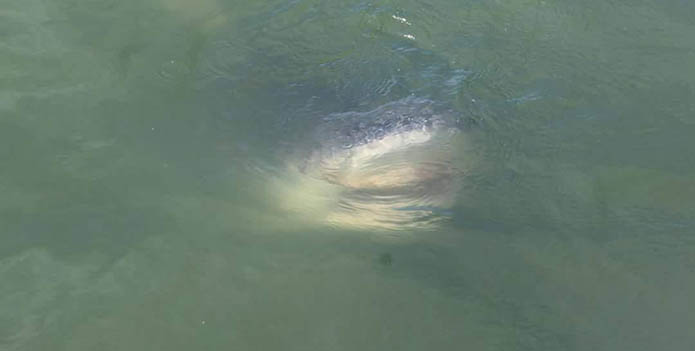Quick! Get out of the water! Call up Spielberg! Prime your Instagram accounts! Ever since commercial fisherman Larry "Boo" Powley pulled an 8.6-foot, 310-pound bull shark from his pound net at the mouth of the Patuxent River in Southern Maryland in August 2018, the Twittersphere is all aflame. But just how common are bull sharks in the Bay? What does this sighting mean for the health of our waters? And, perhaps most importantly of all, can we stop freaking out yet? We sat down with CBF's Maryland Senior Scientist Doug Myers for his thoughts.
What does this shark sighting mean with regard to the health of the Bay?
The appearance of top predators like these is another sign of a healthy, rebounding ecosystem.
Are bull sharks common in Maryland waters?
Bull sharks are the most likely shark species of any size to enter the Maryland section of the Bay. They are a coastal species that breeds near the mouth of estuaries at around 10 years of age. They give birth to a litter of 4-10 pups and the young spend several years growing up in the estuary before ranging widely in coastal ocean waters. Bull shark pups have low survival rates based on predation and pollution affecting their food supply.
How far up rivers have bull sharks been known to travel?
Bull sharks have been sighted hundreds of miles up the Mississippi River, as far as Illinois and Indiana on the Ohio, as well as in the Amazon River. There are records of bull shark catches from gill netters in the Bay as far north as the Bay Bridge.
What are the origins of the name "bull shark"?
Their common name comes from their aggressive, territorial nature, and their behavior of bumping into prey before striking. As opportunistic feeders, they feed on a wide range of species including fish, birds, mammals, and even other shark species.
Are sharks endangered?
Their conservation status is unlisted in the United States but they are on the IUCN Red List at a low level of concern. Worldwide, sharks are fished legally and illegally for liver oil, skins and to make shark fin soup.
How common are shark attacks?
To put shark attacks in perspective, about 20 people die each year from shark attacks worldwide. But more than 20,000 sharks are killed commercially each year! Here's a useful link to compare your risk of shark attack-related death to other common [and not so common] causes.
Has there ever been a recorded shark attack on a human in the Chesapeake Bay?
No. According to the Chesapeake Bay Program website: "As of 2015, the Maryland Department of Natural Resources had not recorded any shark attacks in the Chesapeake Bay or in any of Maryland's waters. The International Shark Attack File records no unprovoked shark attacks in the state of Maryland and only five in the state of Virginia, none of which occurred in the Chesapeake."




